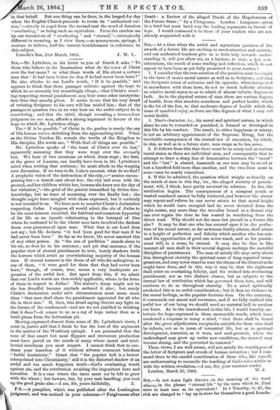Sin,—Mr. Lyttelton, in his letter to you of March 8,
asks, "To
those who believe in the Incarnation what do the tears of Christ
over the lost mean ? or what those words of His about a certain
man that 'It had been batter for him if he had never been born?"
He also alludes to our Lord's words, "If it be possible," and
appears to think that those passages militate against the hope to which he so earnestly but tremblingly clings,—that Christ's teach- ing respecting eternal punishment may bear some other interpreta- tion than that usually given. It seems to me that his very dread of twisting Scripture to his own will has misled him ; that of the passages in question two in no wise bear on the awful subject he is considering ; and that the third, though revealing a tremendous judgment on one man, affords a strong argument in favour of the hope to which Mr. Lyttelton clings.
The "If it be possible" of Christ in the garden is surely the cry of His human nature shrinking from the approaching trial. When as the Divine Teacher He reveals the truths of the Kingdom to His disciples, His words are, "With God all things are possible."
Mr. Lyttelton speaks of "the tears of Christ over the lost," apparently assuming that they were wept over the eternally lost. We hear of two occasions on which Jesus wept ; the first, at the grave of Lazarus, can hardly have been in Mr. Lyttelton's mind when writing that sentence ; he must allude to the weeping over Jerusalem. If we turn to St. Luke's account, what do we find? A prophetic vision of the destruction of the city,—" armies encom- passing her—a trench cast about her; the city laid even with the ground, and her children within her, because she knew not the day of her visitation:'—the grief of the patriot intensified by divine fore- knowledge, but no trace of mourning over the finally lost ; the thought might have mingled with those expressed, but it certainly is not revealed to us. We have now to consider Christ's declaration respecting Judas. I suppose all would admit the sin of Judas to be the most heinous recorded, the habitual and conscious hypocrisy of his life as an Apostle culminating in the betrayal of One whom he confessed to be the Christ must have involved the darkest doom ever pronounced upon man. What that is our Lord does not say ; but He declares "it had been good for that man if he had never been born." So far as we know, He never asserted this of any other person. As "the son of perdition" stands alone in his sin, so does he in his sentence ; and yet that sentence, if the popular view of eternal punishment be true, barely shadows forth the horrors which await an overwhelming majority of the human race. If eternal torment is the doom of all who die unforgiven, to say of them, "it were good for them that they had never been born," though, of course, true, seems a very inadequate ex- pression of the awful fact. But apart from this, if we admit that our Lord's words are thus widely applicable, where is the force of them in respect to Judas? The traitor's doom might not be the less dreadful because myriads endured it also ; but surely Christ's declaration under such circumstances must mean more than "that man shall share the punishment appointed for all who die in their sins." If, then, this dread saying throws any light on the future of the condemned—and are we not justified in thinking that it does ?—it comes to us as a ray of hope rather than as a lurid gleam from the bottomless pit.
Having expressed dissent from some of Mr. Lyttelton's views, I must in justice add that I think he has the best of the argument in the matter of the Westbury epitaph. I am persuaded that the tone of that smart but most flippant and irreverent production must have jarred on the minds of many whose moral and intel- lectual manliness you most respect. I cannot think that to con- demn your insertion of it without adverse comment betokens "feeble femininity." Grant that "the popular hell is a horror interpolated into Christianity," still it is the distorted shadow of an awfpl and too much forgotten truth—God's everlasting wrath against sin, and the retribution awaiting the impenitent here and hereafter. It is a case where the tares must not be left to grow with the wheat ; but beware, lest, by your rash handling, you root Death : a Review of the alleged Proofs of the Hopelessness of the Future State ; " by a Clergyman. London : Longman—gives in a brief but most lucid way the leading arguments in favour of hope. I would commend it to those of your readers who are not already acquainted with it.






























 Previous page
Previous page